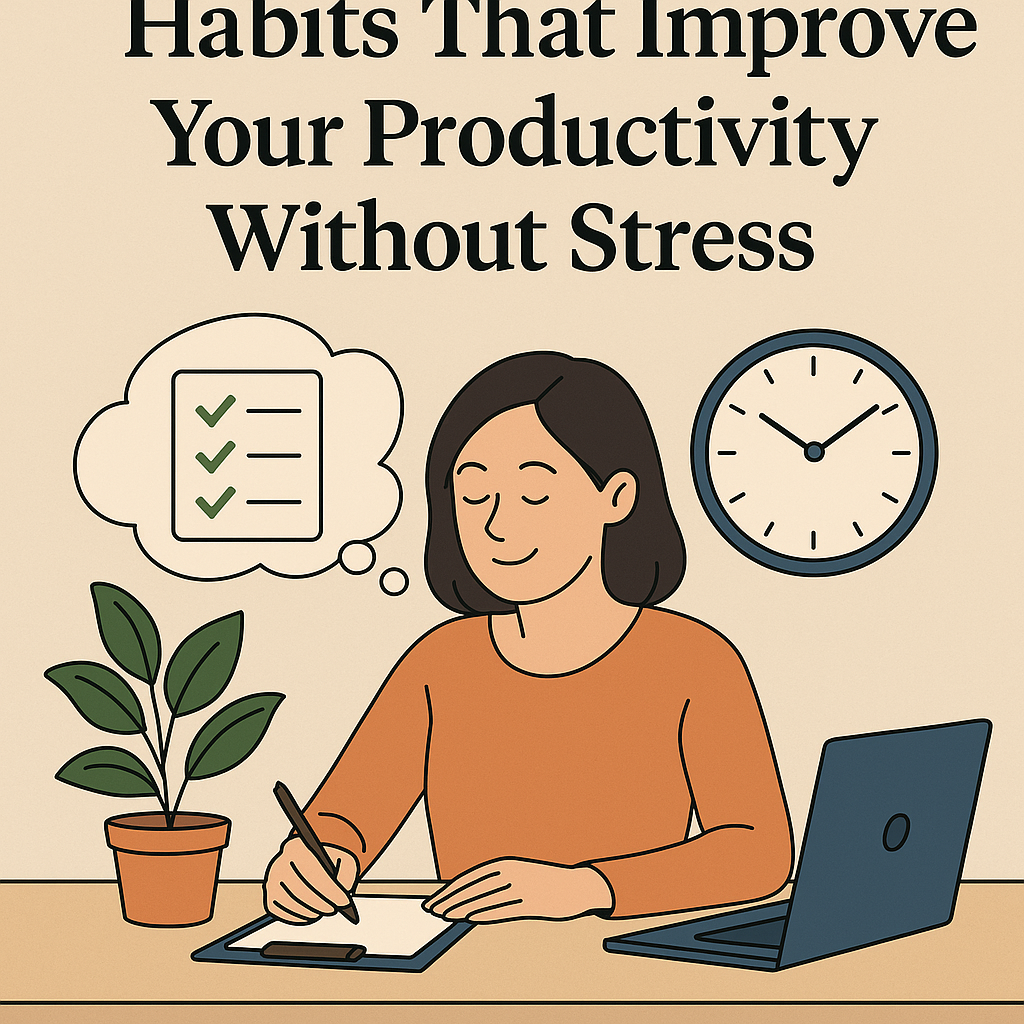Productivity is often associated with long hours, strict routines, and constant hustle. But real productivity — the kind that leads to sustainable success — comes from working smarter, not harder. When you focus on the right habits, you can increase your output and well-being without burning out.
In this article, you’ll learn simple, actionable habits that will help you become more productive while keeping your stress levels low.
Redefining Productivity: It’s Not About Doing More
Productivity doesn’t mean being busy all day. True productivity is about making progress on what matters most. It’s about being intentional, using your time effectively, and protecting your energy.
By focusing on quality over quantity and prioritizing rest, you can create a system that allows you to thrive.
1. Start Your Day With a Clear Plan
One of the most effective ways to reduce stress and increase focus is to start your day with clarity. Take 10 minutes each morning to:
- Identify your top 3 priorities
- Schedule blocks of time for focused work
- Leave room for breaks and flexibility
Avoid overloading your to-do list. A manageable plan prevents decision fatigue and reduces overwhelm.
2. Use the Two-Minute Rule
If a task takes less than two minutes to complete, do it immediately. This principle, popularized by productivity expert David Allen, keeps small tasks from piling up.
Examples:
- Replying to a short email
- Filing a document
- Tidying your workspace
Quick wins help clear mental clutter and give you a sense of progress early in the day.
3. Take Regular, Intentional Breaks
Working for long hours without rest reduces focus, creativity, and decision-making. Instead, work in focused intervals with short breaks in between.
Try the Pomodoro Technique:
- 25 minutes of focused work
- 5-minute break
- After four sessions, take a 15–30 minute break
Use your breaks to stretch, hydrate, or take a short walk — not just scroll your phone.
4. Eliminate Multitasking
Multitasking may feel productive, but it actually reduces efficiency and increases mental fatigue. When you switch between tasks, your brain takes time to reorient, which slows you down and drains focus.
Practice single-tasking:
- Silence unnecessary notifications
- Focus on one task at a time
- Complete it before moving on
Your brain will thank you for the calm and clarity.
5. Optimize Your Environment
Your physical space has a direct impact on your mental clarity. A cluttered or noisy environment can increase stress and reduce focus.
Tips for a productive space:
- Keep your workspace tidy
- Use natural light if possible
- Add plants or calming elements
- Eliminate digital distractions
A peaceful environment promotes calm, focused energy.
6. Prioritize High-Energy Tasks
Not all hours of the day are equal. Pay attention to when your energy and focus are at their peak — for many, it’s the morning hours — and schedule your most demanding work during that time.
Reserve lower-energy tasks, like responding to emails or data entry, for later in the day.
This alignment with your natural rhythm boosts both efficiency and satisfaction.
7. Set Boundaries With Your Time
Saying yes to everything leads to burnout and scattered focus. Respect your own time by setting clear boundaries.
Examples:
- Turn off work notifications after hours
- Use time blocks for deep work
- Communicate availability clearly with others
Protecting your time reduces stress and helps you work on what truly matters.
8. Practice the “Done is Better Than Perfect” Mindset
Perfectionism can be a major productivity killer. Spending too much time refining details delays progress and creates unnecessary stress.
Adopt the mindset that done is better than perfect:
- Aim for excellence, not flawlessness
- Review and improve after delivering
- Let go of unnecessary self-criticism
Progress leads to more learning and growth than perfection ever will.
9. Reflect at the End of the Day
Taking five minutes at the end of your day to reflect helps you learn and reset. Ask yourself:
- What went well today?
- What could be improved?
- What’s one thing I’m proud of?
This practice reinforces positive habits, encourages continuous improvement, and closes your day with intention.
10. Prioritize Sleep and Well-Being
Sleep, hydration, nutrition, and movement are not separate from productivity — they are the foundation of it.
You can’t operate at your best when you’re sleep-deprived or run-down. Protect your energy the same way you protect your schedule.
Simple wellness habits:
- Get 7–9 hours of sleep
- Drink plenty of water
- Eat balanced meals
- Move your body every day
When your body feels good, your mind performs better.
Sustainable Productivity Is Built, Not Forced
You don’t need to overhaul your life to be more productive. Start with one or two habits from this list and build from there. Focus on systems, not willpower. Progress, not pressure.
By creating a supportive routine, protecting your energy, and staying aligned with your values, you’ll not only get more done — you’ll enjoy the process too.
